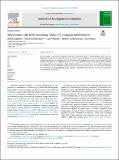When nature calls back : sustaining behavioral change in rural Pakistan
Abstract
We implement a randomized controlled trial and a qualitative study to assess whether, and if so how, behavioral change can be sustained. We do so in the context of Pakistan’s national sanitation strategy to combat open defecation, Community-Led Total Sanitation. Our findings demonstrate that continued follow-up activities that build on the original intervention lead to only modest reductions in reversal to unsafe sanitation on average, but gain in importance where initial conditions are unfavorable, i.e. poor public infrastructure and sanitation facilities. Promotion efforts are hence best targeted towards those who face larger difficulties in constructing and maintaining high-quality sanitation. The effects were sustained at least one year after the implementation of activities.
Citation
Augsburg , B , Bancalari , A , Durrani , Z , Vaidyanathan , M & White , Z 2022 , ' When nature calls back : sustaining behavioral change in rural Pakistan ' , Journal of Development Economics , vol. 158 , 102933 . https://doi.org/10.1016/j.jdeveco.2022.102933
Publication
Journal of Development Economics
Status
Peer reviewed
ISSN
0304-3878Type
Journal article
Description
Funding: Authors gratefully acknowledge financial support from FCDO (at that time DfID), Contract: DFID 6507 ‘‘Monitoring, Verification and Evaluation Service Provider for the WASH Results Programme’’ and from the ESRC Centre for the Microeconomic Analysis of Public Policy (ES/T014334/1).Collections
Items in the St Andrews Research Repository are protected by copyright, with all rights reserved, unless otherwise indicated.

